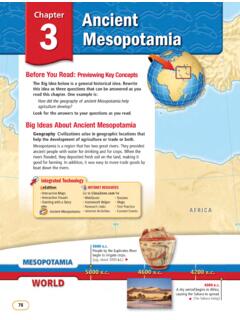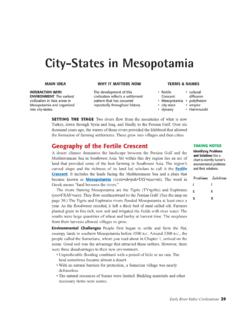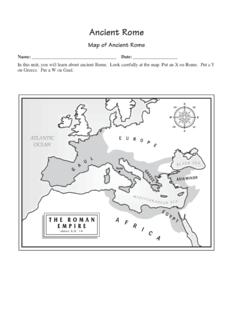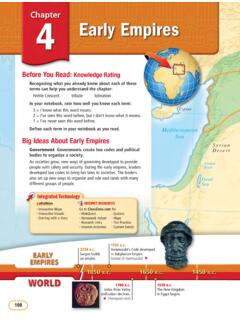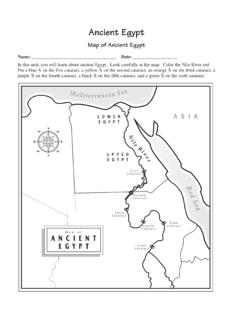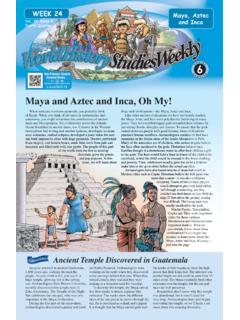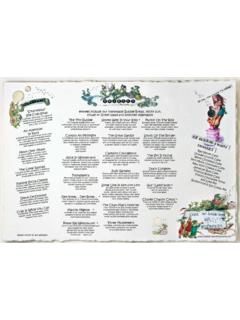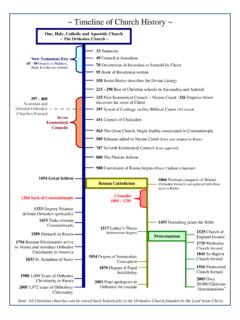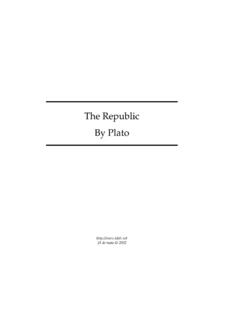Transcription of Ancient Greece - 6th Grade Social Studies
1 Ancient GreeceMap of Ancient GreeceName: _____ Date: _____In this unit, you will learn about Ancient Greece . Look carefully at the map. Put an X on Athens. Put a Y on Sparta. Put an O on Mount GreeceVocabulary 1. Alexander the Great Ancient Macedonian who conquered most of the known world around 334 2. Archimedes Ancient greek inventor and mathematician who invented Archimedes Screw 3. aristocrats wealthy property owners in Ancient Greece 4. Aristotle Ancient greek philosopher; teacher of Alexander the Great 5. Athens Ancient greek city-state 6. city-state an Ancient greek region that has its own government and citizenry 7. Delian League Ancient Athens and her allies 8. Euclid Ancient greek mathematician who developed a branch of geometry 9. freeman male citizen of Ancient Athens 10. fresco a type of painting in which a picture is painted onto a plaster wall 11. helots Ancient Spartan slaves 12. Hellenistic Age Ancient greek civilization that emerged under the rule of Alexander the Great 13.
2 Hippocrates Ancient greek doctor who believed that disease had natural causes that could be studied 14. immortal to live forever 15. Minoan civilization early greek civilization located on the island of Crete (2500 ) 16. Mount Olympus mountain on which the Ancient Greeks believed the gods and goddesses lived 17. Mycenae early greek civilization located in Peloponnesus (2000 ) 18. oligarchy type of government where only a few people rule the many 19. Peloponnesus League Ancient Sparta and her alliesAncient Greece Vocabulary (cont.) 20. Peloponnesian War Ancient conflict between Athens and Sparta (431 ) 21. polytheism belief in more than one god 22. Plato Ancient greek philosopher; student of Socrates 23. Pythagoras Ancient greek mathematician 24. Socrates Ancient greek philosopher who developed the Socratic method 25. Sparta Ancient greek city-state 26. thetes Ancient Athenian craftsman or laborer 27. Thucydides Ancient general and historian who fought in and wrote about the Peloponnesian War 28.
3 Trojan War legendary battle between the Ancient Greeks and the people of Troy in the 12th or 13th century greek CivilizationsBrief #1 The physical geography of any place is an important key in understanding how and why its civilization developed the way it did. Ancient greek civilization is a good example of this Greece was located along the coasts of three large bodies of water: the Aegean Sea, the Mediterranean Sea, and the Ionian Sea. Because of this, the Ancient Greeks were excellent sailors and traders. The interior of Greece is made up of a lot of mountains. In Ancient times, this kept populations of people isolated from one another. This isolation helped communities develop independently from one another. These areas had their own governments and their own ideas about how things should be done. Eventually, these independent communities would grow into greek city-states. A city-state was a region in Ancient Greece with its own government and citizenry.
4 Athens, Sparta, and Thebes were important Ancient greek city-states. Crete and MycenaeAncient Greece consisted of many islands located out in the Mediterranean Sea. One of these islands was called Crete. In about 2500 , the Minoan civilization existed there. The civilization gets its name from King Minos. The Minoans were great traders. They were also skilled potters and painted beautiful frescoes on the walls of their palaces. A fresco is a painting on a plaster wall. In about 2000 , the Minoan civilization began to decline. No one is really sure why this happened. Scholars do know, however, that some Minoans migrated to and settled on the mainland of Greece . After a time, these settlements grew into powerful of these greek city-states was called Mycenae. It was located in an area on the greek mainland called the Peloponnesus. The Mycenae people were warriors, and they built a city which was fortified by huge stone walls.
5 The huge stone lions that guard the entrance to the Mycenae citadel (a kind of palace) still stand to this very 1. city-state 2. Minoan civilization 3. fresco 4. MycenaeFocusThe physical geography of Ancient Greece played a big role in how it FactThe palace of King Minos had 1500 rooms!Athens and SpartaBrief #2 Although Athens and Sparta were both a part of what is considered to be Ancient Greece , they were two independent city-states. These two city-states had different cultures and political systems, but they did speak the same language. Politics in Ancient AthensThe political system in Athens in 500 was a democracy. Ancient Athens had elected officials and an assembly. To be part of the Athenian Assembly, you simply had to be a citizen of Athens. Of course, the Ancient Athenians did keep slaves. Slaves were not allowed to take part in politics. In addition to the assembly, there was also a council of five hundred members.
6 The job of the council was to execute the decisions made by the Assembly. The Ancient Athenians believed that it was every citizen s duty to participate in politics. Citizens had to serve on juries and be informed and able to discuss the issues that were important to their city. Life in Ancient AthensLike most civilizations, Athenian society had a structure. Freemen were the male citizens of Athens. Among the freemen there were aristocrats. Aristocrats were wealthy men who owned property. Aristocrats could also be military men. Farmers made up the middle ranks. At the bottom were the thetes. The thetes were craftsmen and men who did manual labor. In Ancient Athenian society, boys, especially if they came from the aristocracy, were well educated. They studied math, music, reading, and writing. Older boys could go to a kind of college where they continued their Studies in philosophy and ethics. All male citizens were required to train in the military for two years.
7 Life was different for girls in Ancient Athens. They were not educated, even if they did come from wealthy families. Women were considered to be the property of their husbands. Athenian girls learned domestic duties like spinning and 1. Athens 2. Sparta 3. freemen 4. aristocrats 5. thetes 6. oligarchyFocusAthens and Sparta became two of the most powerful greek and Sparta Brief #2 (cont.) The Military in Ancient SpartaThe government of Ancient Sparta was a kind of combination of an oligarchy and a democracy. An oligarchy is a government that is led by a few people. ( Ancient Sparta did have some elected officials.)In Ancient Sparta, the military was the most important thing in their politics and society. When boys turned seven years old, they were taken from their parents and sent away to learn how to be soldiers. They were treated badly and given very few clothes and little food. They were expected to steal what they needed in order to survive.
8 This is how the Spartans taught survival skills. As a result, the Spartan army was the strongest and most feared military in the region. Life in Ancient SpartaPhysical strength was highly prized in Ancient Spartan society, for both men and women. Everyone was expected to exercise and be physically fit. The Spartans frowned upon luxuries and comfort. Being tough and self-reliant was in Ancient Athens, Spartan women were educated. They learned how to read and write. They took part in athletics. They were also allowed to own property. The Spartans believed that all of these things would help Spartan women have healthy usually married at about the age of twenty. But even after marriage, Spartan men lived most of their lives in military camps away from their city-states in Ancient Greece had slaves, but the slave population in Ancient Sparta was enormous. The Spartan slaves were called helots. They were treated very badly beaten, humiliated, and often murdered.
9 Because the helot population was so huge, they outnumbered the Spartans. So the Spartans had a hard time keeping them under control. There were often slave rebellions, which challenged Spartan authority. Vocabulary (cont.) 7. oligarchy 8. helots 9. Delian League 10. Peloponnesus League 1 1. Peloponnesian War 12. ThucydidesFast FactSpartan infants would be put to death if they were sick or and Sparta Brief #2 (cont.) The Peloponnesian WarThe greek city-states of Athens and Sparta both had power and influence in the region. They each also had alliances with various city-states. Athens formed the Delian League. The Delian League was a group of many greek city-states, including Thessaly and Thrace. The Delian League was originally formed to fight the Persian Army when they invaded Athens in 490 Sparta had allies in the region, too. The greek city-states who allied with Sparta were called the Peloponnesus League. They included Corinth and broke out between Athens and Sparta and their rivals in 431 This twenty-seven-year conflict between Athens and Sparta is known as the Peloponnesian War.
10 Athens and Sparta Brief #2 (cont.) The Peloponnesian War (cont.)The Peloponnesian War consumed the entire region. Sometimes Athens would seem to be winning, and at other times Sparta would be victorious. Athens had a strong navy, and there were many battles at sea fought during this conflict. But Sparta had a powerful land army. The army attacked villages and towns, and destroyed farms. The constant fighting weakened both sides in the conflict, but it was Athens that surrendered in 404 Although Sparta was the victor, the war had taken its toll on them, too. They were never again the superpower they once were. ThucydidesThucydides was a general in the Athenian army. He fought during the Peloponnesian War. After the war, he wrote a detailed history of it called History of the Peloponnesian War. It is a collection of eight books. In his books, Thucydides strove to be impartial and fair in his telling of the events, even though he was an Athenian general.
